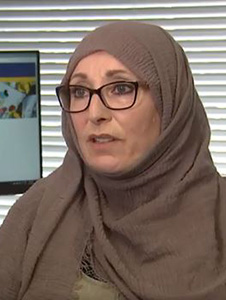
Dr Ruqauua Sulaiman-Hill.
A new Health Research Council-funded study is about to get underway to help understand the psychological and physical effects of the March 15 Mosque attacks in Christchurch last year and to link those directly affected with additional support, if needed.
Following the tragedy on March 15, the Health Research Council (HRC) approached the Canterbury District Health Board (CDHB) and the universities of Otago and Canterbury about fast-tracking HRC funding of research to help those directly affected. An expert team comprising of clinical researchers from all three organisations was then formed, led by the University of Otago, Christchurch’s Associate Professor Caroline Bell and Dr Ruqayya Sulaiman-Hill.
Dr Sulaiman-Hill, who has been involved with the local Muslim response since the attacks, says the Muslim community has been integral to developing the successful research proposal and that they will continue to be closely involved at all stages of the research.
“The aim of the study is to help understand the impact that March 15 has had on the Christchurch Muslim community, particularly those present at the mosques and their close family, and close family of the shuhada (martyrs/witnesses). Interviews will be conducted by trained Muslim researchers from the local community accompanied by specialist mental health nurses,” says Dr Sulaiman-Hill.
“This was one of the worst mass shootings in history, and as far as we are aware, the first to involve Muslim people in a western context. Within the Muslim community, there is an acute awareness that research like this needs to be done to ensure that nobody affected who needs help slips through the cracks,” she says.
Imams (religious leaders) Alabi Lateef Zikrullah and Gamal Fouda from the two Mosques targeted in the attacks (Linwood Mosque and Masjid Al Noor Mosque respectively) have endorsed the study and will be involved in advising the research team on any issues that may arise, along with a reference group made up of a diverse range of people from the wider Muslim community in Christchurch.
Associate Professor Caroline Bell, who managed the Canterbury DHB’s mental health responses after the Christchurch earthquakes, says the research will result in a greater understanding of the impact of March 15 on those most affected, even if they feel they have coped well. It will also identify what people have found helpful both personally, through their faith and social connections, and practically in terms of services provided, and what could be done better.
“A big strength of this study is the strong connection we have with CDHB. Anyone identified as needing further help will be supported to access appropriate services such as in the community, primary care or specialist services,” says Associate Professor Bell.
“A large part of our research involves culturally appropriate screening for mental health conditions. Previous work after mass shooting events has found that without such screening, a lot of people who would have benefited from help would not have accessed this.”
The research team on this study have collaborated with international centres in the UK and in Norway with the Norwegian Directorate of Health, who have been carrying out research into the long-term consequences of the terror attacks in Oslo, Norway in 2011 that left 77 people dead.
Dr Sulaiman-Hill says the experiences gained through the Christchurch earthquakes has had a powerful influence on how the community has come together after this tragedy.
“Christchurch has been through so much over the past nine years. I think there is a strong understanding in the community that events like March 15 can have repercussions throughout people’s lives and that it can take a long time for people to recover.”
For further information, contact:
Kim Thomas
Senior Communications Advisor
University of Otago, Christchurch
Mob +64 27 222 6016
Email kim.thomas@otago.ac.nz
Related links
The March 15 Study: Impacts and Recovery
Find an Otago expert
Use our Media Expertise Database to find an Otago researcher for media comment.
